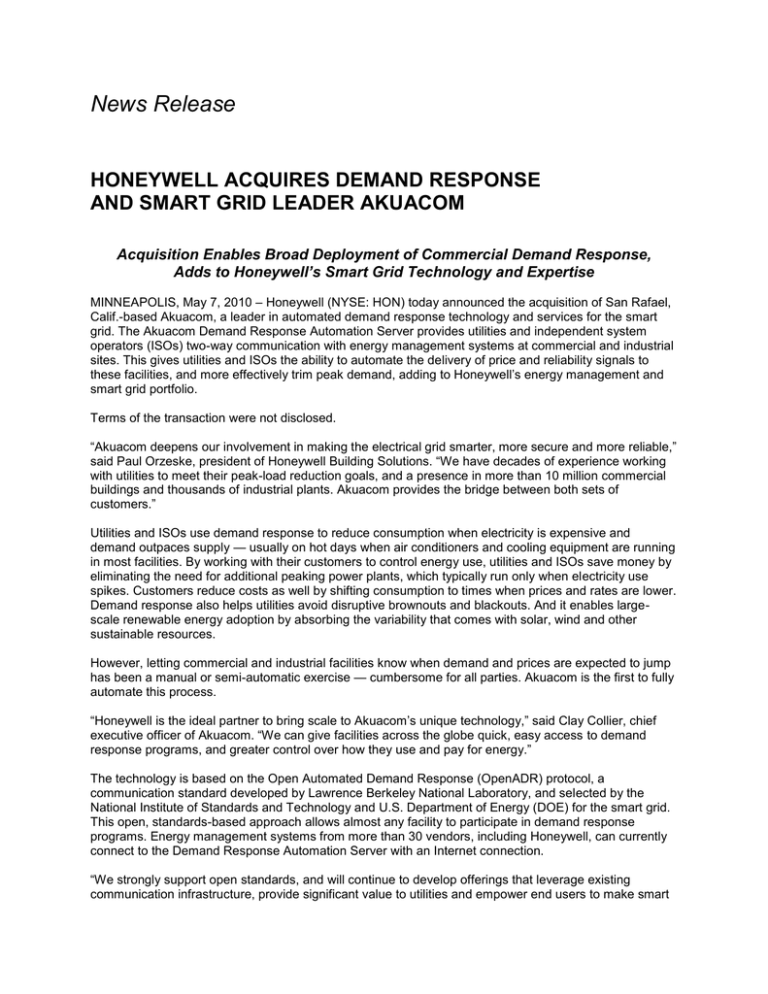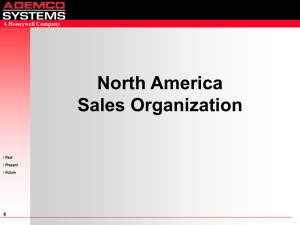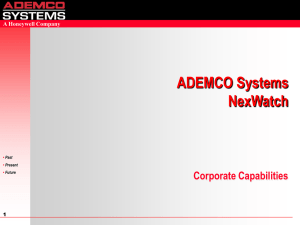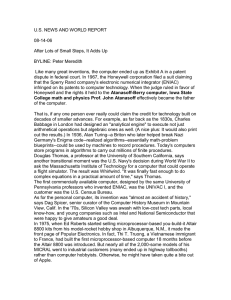News Release HONEYWELL ACQUIRES DEMAND RESPONSE AND SMART GRID LEADER AKUACOM
advertisement

News Release HONEYWELL ACQUIRES DEMAND RESPONSE AND SMART GRID LEADER AKUACOM Acquisition Enables Broad Deployment of Commercial Demand Response, Adds to Honeywell’s Smart Grid Technology and Expertise MINNEAPOLIS, May 7, 2010 – Honeywell (NYSE: HON) today announced the acquisition of San Rafael, Calif.-based Akuacom, a leader in automated demand response technology and services for the smart grid. The Akuacom Demand Response Automation Server provides utilities and independent system operators (ISOs) two-way communication with energy management systems at commercial and industrial sites. This gives utilities and ISOs the ability to automate the delivery of price and reliability signals to these facilities, and more effectively trim peak demand, adding to Honeywell’s energy management and smart grid portfolio. Terms of the transaction were not disclosed. ―Akuacom deepens our involvement in making the electrical grid smarter, more secure and more reliable,‖ said Paul Orzeske, president of Honeywell Building Solutions. ―We have decades of experience working with utilities to meet their peak-load reduction goals, and a presence in more than 10 million commercial buildings and thousands of industrial plants. Akuacom provides the bridge between both sets of customers.‖ Utilities and ISOs use demand response to reduce consumption when electricity is expensive and demand outpaces supply — usually on hot days when air conditioners and cooling equipment are running in most facilities. By working with their customers to control energy use, utilities and ISOs save money by eliminating the need for additional peaking power plants, which typically run only when electricity use spikes. Customers reduce costs as well by shifting consumption to times when prices and rates are lower. Demand response also helps utilities avoid disruptive brownouts and blackouts. And it enables largescale renewable energy adoption by absorbing the variability that comes with solar, wind and other sustainable resources. However, letting commercial and industrial facilities know when demand and prices are expected to jump has been a manual or semi-automatic exercise — cumbersome for all parties. Akuacom is the first to fully automate this process. ―Honeywell is the ideal partner to bring scale to Akuacom’s unique technology,‖ said Clay Collier, chief executive officer of Akuacom. ―We can give facilities across the globe quick, easy access to demand response programs, and greater control over how they use and pay for energy.‖ The technology is based on the Open Automated Demand Response (OpenADR) protocol, a communication standard developed by Lawrence Berkeley National Laboratory, and selected by the National Institute of Standards and Technology and U.S. Department of Energy (DOE) for the smart grid. This open, standards-based approach allows almost any facility to participate in demand response programs. Energy management systems from more than 30 vendors, including Honeywell, can currently connect to the Demand Response Automation Server with an Internet connection. ―We strongly support open standards, and will continue to develop offerings that leverage existing communication infrastructure, provide significant value to utilities and empower end users to make smart energy choices with minimal effort,‖ Orzeske said. ―Those elements are essential for quickly expanding the reach and impact of the smart grid.‖ Akuacom will be integrated into Honeywell Building Solutions, a global provider of energy and utility services, as well as building automation technology and support services. The acquisition complements Honeywell’s experience in managing all aspects of utility-sponsored demand response programs — from program design and load-control technology to marketing and customer support. With 30 years of experience in the utility industry, Honeywell is the largest implementer of residential demand response in North America. It also has the best-selling demand response thermostat, UtilityPRO, a touchscreen device designed specifically for residential programs. Honeywell has given utilities combined control of more than 1 gigawatt of peak load, which is equivalent to the generation capacity of approximately 20 gas-fired peaking plants. In addition, Honeywell was one of only four non-utility companies to receive a Smart Grid Investment Grant (SGIG) from DOE as part of the American Recovery and Reinvestment Act. It is using the grant to support a critical peak pricing response program that will use Akuacom’s technology to help approximately 700 commercial and industrial facilities in the Southern California Edison service territory reduce peak consumption and costs. Honeywell is also helping other organizations with projects tied to the SGIGs. Honeywell International (www.honeywell.com) is a Fortune 100 diversified technology and manufacturing leader, serving customers worldwide with aerospace products and services; control technologies for buildings, homes and industry; automotive products; turbochargers; and specialty materials. Based in Morris Township, N.J., Honeywell’s shares are traded on the New York, London, and Chicago Stock Exchanges. For more news and information on Honeywell, please visit www.honeywellnow.com. Honeywell Building Solutions is part of the Honeywell Automation and Control Solutions business group, a global leader in providing product and service solutions that improve efficiency and profitability, support regulatory compliance, and maintain safe, comfortable environments in homes, buildings and industry. For more information about Building Solutions: www.honeywell.com/buildingsolutions. This release contains certain statements that may be deemed ―forward-looking statements‖ within the meaning of Section 21E of the Securities Exchange Act of 1934. All statements, other than statements of historical fact, that address activities, events or developments that we or our management intends, expects, projects, believes or anticipates will or may occur in the future are forward-looking statements. Such statements are based upon certain assumptions and assessments made by our management in light of their experience and their perception of historical trends, current economic and industry conditions, expected future developments and other factors they believe to be appropriate. The forwardlooking statements included in this release are also subject to a number of material risks and uncertainties, including but not limited to economic, competitive, governmental, and technological factors affecting our operations, markets, products, services and prices. Such forward-looking statements are not guarantees of future performance, and actual results, developments and business decisions may differ from those envisaged by such forward-looking statements. # # #





